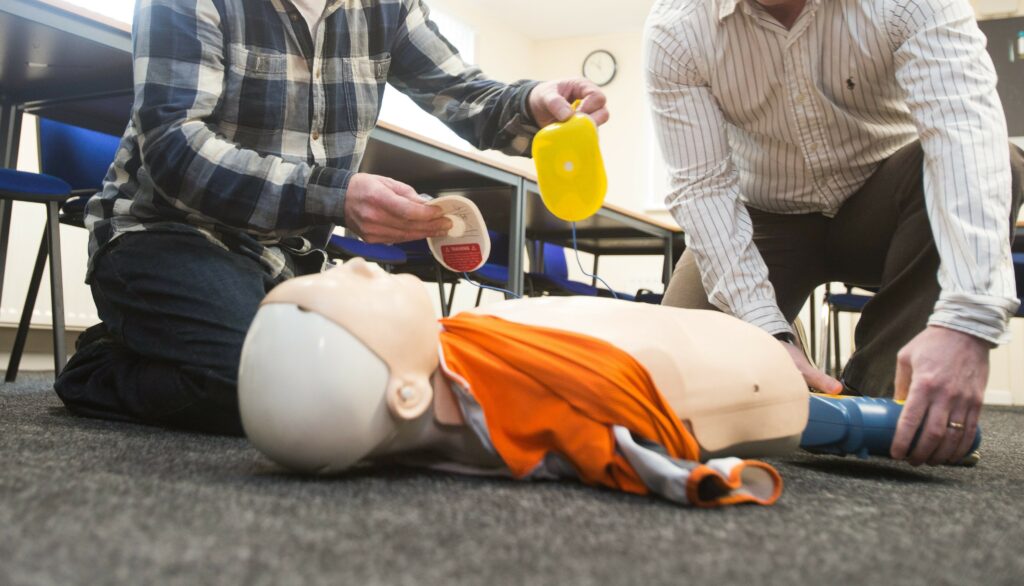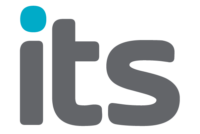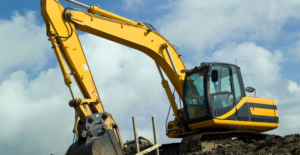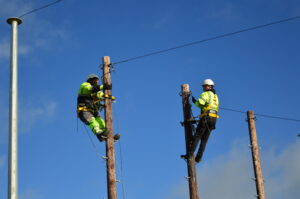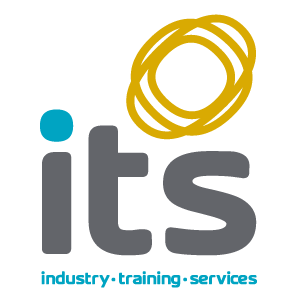Cardiopulmonary resuscitation, commonly known as CPR, is an important element of First Aid training and can mean the difference between life and death in an emergency. CPR and First Aid training is particularly beneficial to individuals who work in high risk environments but is also beneficial for office based employees and other lower risk workplaces. However, anyone can learn and benefit from having these skills.
Cardiac arrest can happen at any time. It is often an unexpected event where the heart stops beating, and the person stops breathing. Without immediate intervention, the chances of survival drastically drop. CPR and First Aid Training makes you better prepared to perform it if an incident occurs within the workplace, at home, or in a public setting. CPR can maintain blood circulation and provide oxygen to the brain and other vital organs until professional medical help arrives.
In the UK, the survival rate for out-of-hospital cardiac arrests is quite low, estimated to be around 7-8%. This statistic highlights the critical need for more people to be trained in CPR, as immediate intervention can significantly improve these numbers.
In Ireland, there have been notable efforts where people are interested in participating in CPR and first aid training. The Irish Heart Foundation has initiated various campaigns to educate and empower individuals with CPR and First Aid Training skills.
Within the industry, health and safety specialists, like ourselves, are continually striving to ensure that workplaces have a sufficient number of trained employees able to respond in an emergency.
Regulations Governing First Aid at Work
The Health and Safety Regulations 1981 require work places to provide adequate First Aid equipment, facilities, and appointed people so employees can be given immediate help if they are injured or take ill at work. Various levels of training are appropriate depending on the particular workplace.
According to HSE Guidance, the number of first aiders in every workplace category is the following: Low-risk workplaces – one first aider for every 50 workers. High-risk workplaces – one first aider for every 25 workers.
First aid certificates last for three years before they need to be renewed, but the HSE recommends a refresher course every year.
CPR Training: The basics
Performing CPR is not complicated, but CPR and First Aid training delivery to people is necessary to give you the confidence to step in and take appropriate action to keep a casualty alive until trained medical professionals arrive.
According to the BHF there are more than 30,000 out-of-hospital cardiac arrests in the UK each year, and each day people needlessly die because bystanders don’t have the confidence or knowledge to perform CPR and defibrillation.
The key steps in CPR delivery include the following:
- Check for responsiveness: Before doing anything, check that the victim is unresponsive. Gently tap the person and shout, “Are you okay?” If there is no response, then you act.
- Contact emergency services: Call 999. In an emergency, every second counts, so make sure professional help is on the way.
- Begin chest compressions: Place the heel of your hand on the centre of the victim’s chest, just below the nipple line. Interlock your fingers and position yourself directly over the victim’s chest. Push hard and fast – at a rate of about 100-120 compressions per minute. Allow the chest to fully recoil after each compression.
- Airway: After 30 chest compressions, two rescue breaths are required. Check that the airway is clear. Open the victim’s airway, tilt their head backward and lift their chin. Pinch the victim’s nose shut, create a seal with your mouth over theirs, and give two rescue breaths. Each breath should last one second. Make sure the chest rises visibly.
- Continue chest compressions: Continue with chest compressions and rescue breaths until professional help arrives or the victim shows signs of life.
The importance of quality CPR and First Aid Training cannot be overstated. Effective chest compressions are essential for maintaining circulation, and rescue breaths help supply oxygen to the victim’s body. Our First Aid at Work courses prepare participants to safely deliver life-saving CPR as well as build knowledge on best practice approaches to deal with various other scenarios where First Aid needs to be employed.
Everyone Should Complete CPR and First Aid Training
We believe that everyone should participate in CPR and First Aid training. These are valuable skills, regardless of your background or profession, but within the workplace it is essential to have trained employees. These designated first aiders or ‘appointed persons’ are the go-to people if an incident occurs. Being knowledgeable and confident in delivering CPR and First Aid training empowers an employee to act if someone in the vicinity suffers a cardiac arrest.
Immediate CPR makes a significant difference in the survival rates of cardiac arrest victims. A workplace or community with higher rates of First Aid and CPR trained individuals is a safer place to be, and your knowledge can benefit not only your colleagues, but also loved ones or strangers in need outside the workplace.
ITS deliver First Aid at Work training courses to a wide variety of businesses and organisations including charities, community groups, retailers, local authorities, and various office based groups. We also train employees who work in higher risk work environments such as construction, manufacturing, and telecoms workers.
Consider taking a First Aid at Work course which incorporates CPR Training to gain the knowledge and confidence needed to perform this life-saving technique. View our Courses: https://www.industrytrainingservices.com/training-courses/first-aid-course/
Contact Us:
Portadown HQ: 028 9592 2765
Dublin HQ: (01) 536 9328
